#General Gordon Granger
Explore tagged Tumblr posts
Text
Exploring the Roots and History of Juneteenth: Honoring Leaders and Activists
Let's remember and honor the historical significance of Juneteenth, celebrating freedom, resilience, and the ongoing fight for justice and equality.
Juneteenth, also known as Freedom Day, Jubilee Day, Liberation Day, or Emancipation Day, is a holiday that commemorates the emancipation of those who had been enslaved in the United States. The history of Juneteenth dates back to June 19, 1865, when Union soldiers arrived in Galveston, Texas, with news that the Civil War had ended and that all enslaved individuals were now free. This was two and…
View On WordPress
#Abolitionists#Activism#Advocacy#African American History#Black History#Celebrating Black History#Celebrating History#Civil Rights#Community Engagement#Emancipation Day#Empowerment#Equality#Freedom Day#General Gordon Granger#Historical Significance#Honoring Leaders#Juneteenth#Liberation Day#Racial Equality#Remembering Juneteenth#Resilience#Social Justice
0 notes
Text
🤎 The Fascinating Origin and History of Juneteenth
The Roots of Juneteenth
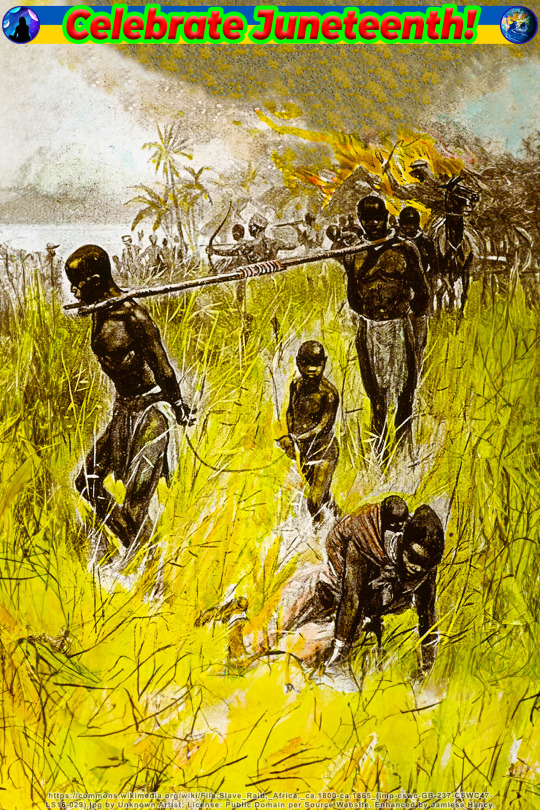
😭 Slavery began with awful slave raids in Africa. [1]
The origin of Juneteenth, a day of profound significance, traces back to June 19, 1865. It was on that day that Union General Gordon Granger arrived in Galveston, Texas, bringing with him the momentous news that the Civil War had ended and that all enslaved people in America were now free, as declared by President Abraham Lincoln's Emancipation Proclamation. The last remaining enslaved African-Americans were finally liberated!
This historic event occurred more than two years after President Abraham Lincoln's Emancipation Proclamation, highlighting the delays and struggles Civil-War-era African-Americans had to overcome to finally gain their freedom. The moment is commemorated annually as Juneteenth, a term derived, of course, by combining "June" and "nineteenth," and has evolved into a powerful symbol of liberation, resilience, and America's continuing journey toward racial equality.
By exploring the origins and historical context of Juneteenth, we gain valuable insights into the enduring spirit of a people who fought for their rightful freedom and the broader narrative of American history.
The Historical Context of Juneteenth
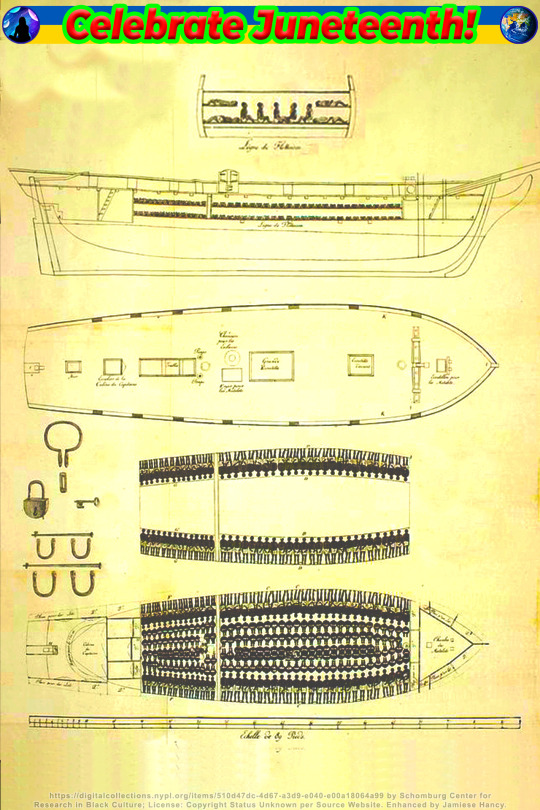
😭 19th Century Vigilante Slave Ship Packing Chart [2]
The historical context of Juneteenth is rooted in the grim reality of the institution of slavery in America, an institution that forcibly brought millions of Africans to American shores and subjugated them to inhumane conditions for centuries.
By the mid-19th century, the United States was sharply divided over the issue of slavery, leading to the eruption of the Civil War in 1861. The Confederate southern states, which relied heavily upon slave labor, fought to preserve their way of life against the northern states, who were determined to end slavery.
In the midst of this brutal conflict, on January 1, 1863, President Abraham Lincoln issued the Emancipation Proclamation, declaring freedom for enslaved people in the Confederate states. However, due to ongoing warfare and the slow spread of information, many enslaved individuals remained unaware of their emancipation.
This delay persisted until Union forces made significant advances into Confederate territory, culminating in General Gordon Granger's announcement in Galveston, Texas, on June 19, 1865.
This pivotal moment not only marked the end of slavery in Texas, but also symbolized a new beginning for the nation, which was striving to rebuild and redefine itself in the aftermath of civil war and slavery.
The Emancipation Proclamation
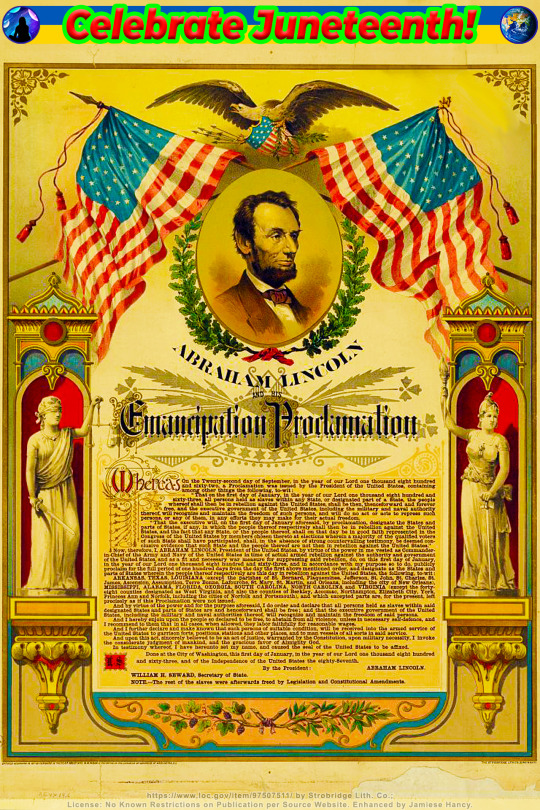
🎩 Abraham Lincoln's Emancipation Proclamation [3]
On January 1, 1863, President Abraham Lincoln issued the Emancipation Proclamation, a landmark executive order that declared freedom for all enslaved people in Confederate-held territory. This bold proclamation shifted the purpose of the Civil War, framing it as a fight not only to preserve the Union, but also to abolish slavery.
However, the immediate impact of the Emancipation Proclamation was limited; it couldn't be enforced in areas still under Confederate control. Nevertheless, the issuance of this proclamation was a crucial step toward ending slavery, as it allowed African-Americans to join the Union Army, bolstering its forces with approximately 200,000 Black soldiers and sailors.
Furthermore, the Emancipation Proclamation set a moral precedent and laid the foundation for the eventual passage of the 13th Amendment, which would completely abolish slavery nationwide.
The Announcement in Texas
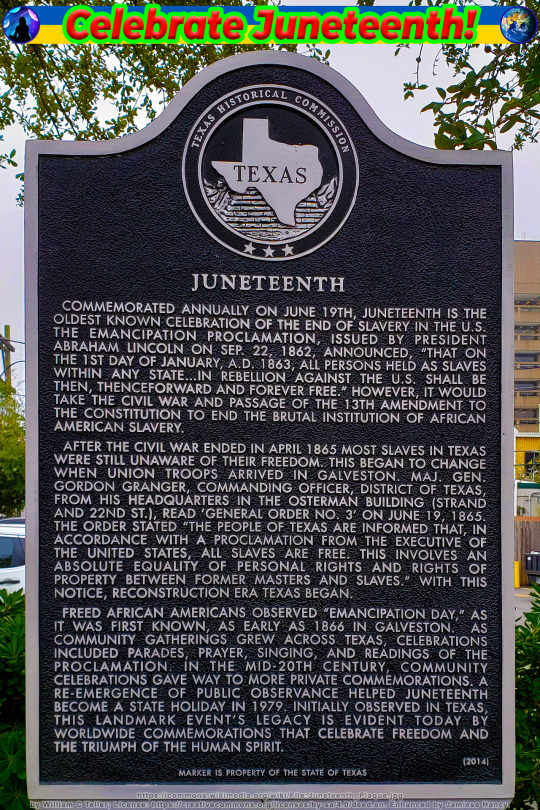
📢 Gen. Gordon Granger's Juneteenth Announcement [4]
The announcement in Texas stands as the cornerstone of Juneteenth's significance. General Granger's issuance of General Order No. 3 publicly proclaimed: "The people of Texas are informed that, in accordance with a proclamation from the Executive of the United States, all slaves are free."
This announcement directly impacted approximately 250,000 enslaved African-Americans in Texas, who had remained in bondage long after their legal emancipation due to the slow dissemination of information and the resistance of enslavers. The news was met with a mixture of astonishment, joy, and relief among the newly freed individuals, while slaveholders faced the abrupt end of an era.
The significance of this day extends beyond the immediate freedom it brought; it marked the beginning of a new chapter for African-Americans, who began to forge their paths as free citizens.
Early Celebrations of Juneteenth
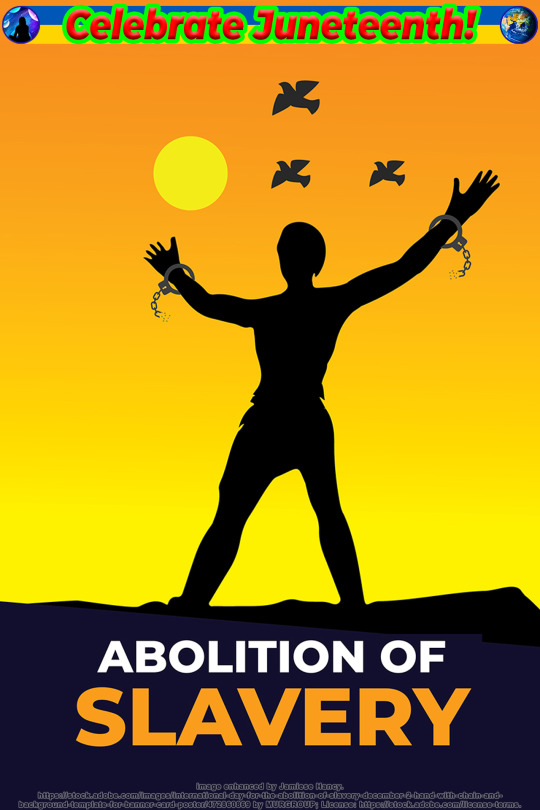
⛓️ On Juneteenth 1865, chains were broken for all! [5]
Early celebrations of Juneteenth, beginning in 1866, were marked by an overwhelming sense of joy, community, and reflection among newly freed African-Americans. The first Juneteenth events were spontaneous gatherings where people rejoiced in their newfound freedom, often held in rural areas or near rivers where they could celebrate without interference.
These early celebrations featured activities such as prayer meetings, singing spirituals, barbecues, and feasting on traditional foods. Participants dressed in their finest clothing – often discarded by former owners – to symbolize their emancipation and newfound dignity.
Emphasis was also placed on education and self-improvement, with leaders delivering speeches about the importance of literacy and political participation.
Despite facing numerous obstacles, including laws that restricted their assembly and ongoing racial discrimination, African-Americans persevered in commemorating Juneteenth annually. These early celebrations were not only acts of remembrance but also declarations of their resilience and enduring hope for a future of equality and justice.
Juneteenth in the 20th Century
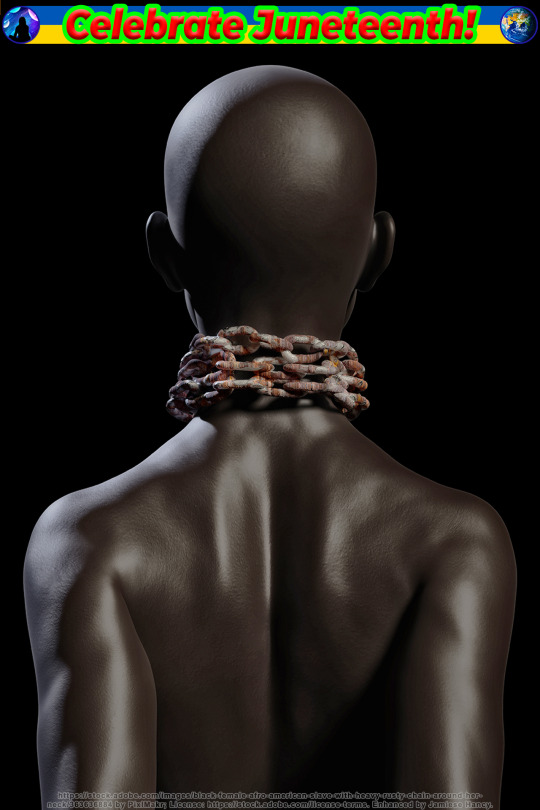
⛓️ On Juneteenth 1865, dignity was restored to all! [6]
Juneteenth in the 20th century experienced periods of both decline and resurgence, reflecting the broader struggles and triumphs of African-American communities.
During the early 1900s, as the Great Migration saw many African-Americans moving from the rural South to urban areas across the country, the nature of Juneteenth celebrations began to change. Urbanization and the pressing need for economic survival often meant less time for public celebrations, and the observance of Juneteenth declined in many areas.
However, the civil rights movements of the 1950s and 1960s brought a renewed focus on African-American history and cultural pride, revitalizing Juneteenth as a symbol of freedom and resistance. Civil rights activists used Juneteenth to highlight the ongoing struggles against segregation and inequality, linking the historical significance of emancipation to contemporary fights for justice.
By the late 20th century, the momentum grew for official recognition, with Texas becoming the first state to establish Juneteenth as a state holiday in 1980. This period also saw the emergence of larger, more organized celebrations featuring parades, festivals, and educational events, reflecting a broader acknowledgment of Juneteenth's importance in the American narrative.
Modern-Day Juneteenth
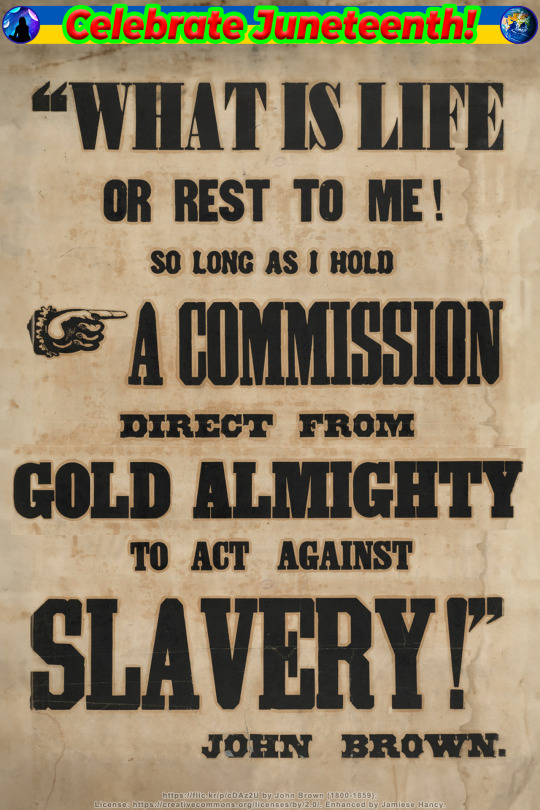
⚰️ Many Americans died fighting for the cause. [7]
Modern-day Juneteenth celebrations continue to evolve, serving as both a commemoration of the past and a call to action for the future.
In recent years, Juneteenth has experienced a resurgence in popularity and significance, fueled by a growing awareness of racial injustices and a renewed commitment to confronting systemic racism.
Across the United States, our neighborhoods come together on June 19th to honor the legacy of emancipation through a variety of activities, including parades, festivals, picnics, educational workshops, and historical reenactments. These activities not only highlight the cultural richness and resilience of the African-American community but also provide opportunities for dialogue, reflection, and collective healing.
Additionally, the official recognition of Juneteenth as a federal holiday in 2021 marked a significant milestone in acknowledging the importance of this day in American history. As Juneteenth continues to gain momentum, it serves as a powerful reminder of the ongoing struggle for equality and justice, inspiring individuals and communities to work toward a more inclusive and equitable future for all.
The Importance of Juneteenth Today
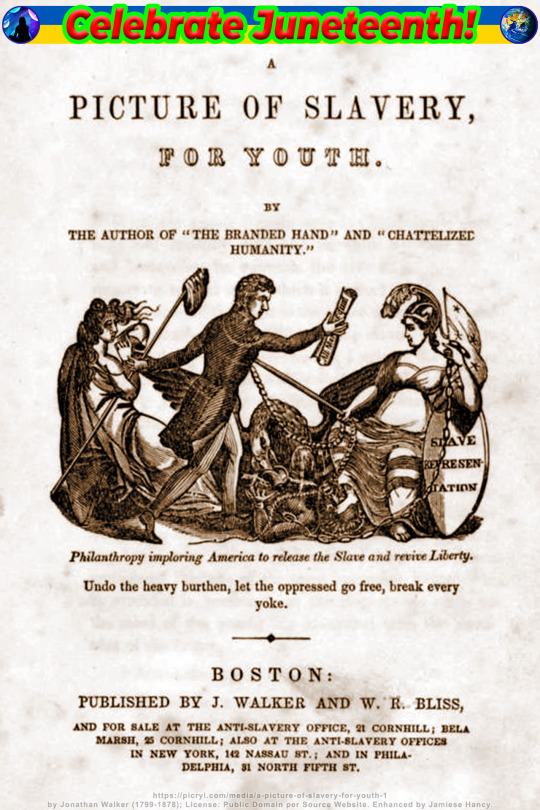
⛓️ Title Page from an 1840's Anti-slavery Book [8]
The importance of Juneteenth today cannot be overstated, as it serves as a vital reminder of the ongoing struggle for racial equality and justice in America. In a time when systemic racism and inequality continue to impact communities of color, Juneteenth provides an opportunity for reflection, education, and action.
By commemorating the end of slavery and celebrating the resilience and strength of African-Americans, Juneteenth fosters a deeper understanding of the complexities of American history and the enduring legacy of oppression.
Moreover, Juneteenth serves as a unifying force, bringing people of all backgrounds together to acknowledge the injustices of the past and commit to building a more inclusive and equitable society for future generations.
As Juneteenth gains wider recognition and celebration, its importance as a day of remembrance, reflection, and activism only continues to grow, reinforcing its significance in the ongoing fight for freedom and equality.
Conclusion: Celebrating the Spirit of Juneteenth

⚰️ Many children died before freedom was secured. [9]
The historical significance and evolution of Juneteenth encapsulates a journey of resilience, resistance, and hope for freedom. Originating from the announcement of emancipation in Texas on June 19, 1865, Juneteenth has evolved into a nationally recognized day commemorating the end of slavery in the United States.
From its early celebrations characterized by spontaneous gatherings of newly-freed African-Americans to its resurgence in the 20th century as a symbol of civil rights and cultural pride, Juneteenth has endured as a testament to the ongoing struggle for racial equality. Its official recognition as a federal holiday in 2021 underscores its profound importance in American history and its role in fostering dialogue, reflection, and activism against systemic racism.
In today's world, where systemic racism continues to plague our society, Juneteenth provides a crucial opportunity for education, reflection, and action. As we honor Juneteenth's historical significance and celebrate its evolution, we also acknowledge the sacrifices of those who fought for freedom and renew our commitment to creating a more just and equitable society for all.
As we reflect upon the importance of Juneteenth in contemporary society, it becomes evident that this day holds profound significance beyond its historical roots. Juneteenth serves as a poignant reminder of the resilience and determination of African-Americans in the face of oppression, and it underscores the ongoing struggle for racial justice and equality.
Juneteenth reminds us that the fight for freedom and justice is far from over and encourages us to stand together in solidarity as we strive to build a society where every individual is valued and respected. As we celebrate Juneteenth each year, let us recommit ourselves to the ongoing work of dismantling systemic oppression and fostering a world where the principles of freedom, equality, and justice ring true for all.
As we conclude our exploration of Juneteenth, let's all of us join in the celebration and commemoration of this significant day. Participate in Juneteenth events in your community, whether it's attending a parade, joining a festival, or engaging in educational workshops.
Take the time to learn more about the history of Juneteenth and its profound impact on American society. Share this knowledge with others, whether it's through conversations with friends and family, social media posts, or community outreach initiatives.
By actively participating in Juneteenth celebrations and educating others about its history, we not only honor the struggles and achievements of those who came before us and fought for freedom, but we also contribute to America's ongoing journey toward a more just and equitable society. Let's embrace Juneteenth as a time for reflection, remembrance, and action, and work together to ensure that its significance is recognized and celebrated for generations to come. ☮️ Peace... Jamiese
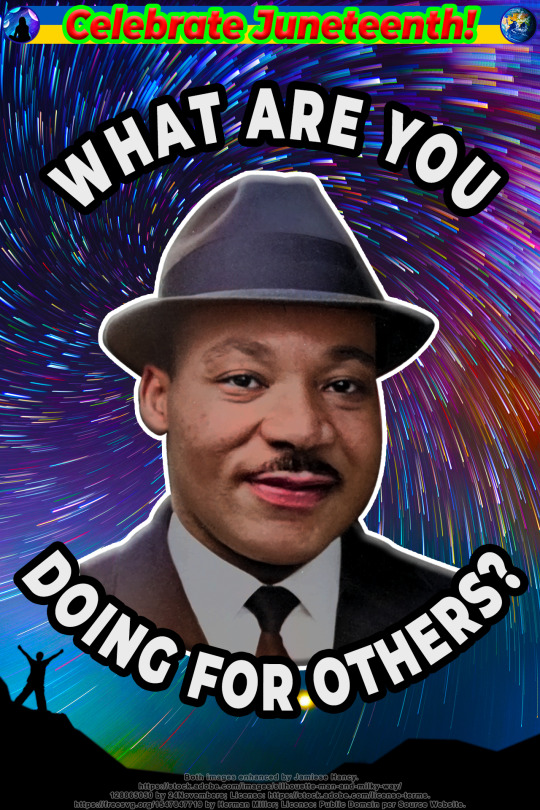
🤎 Celebrate Juneteenth, but the effort goes on. [10]
📚 Text Sources:
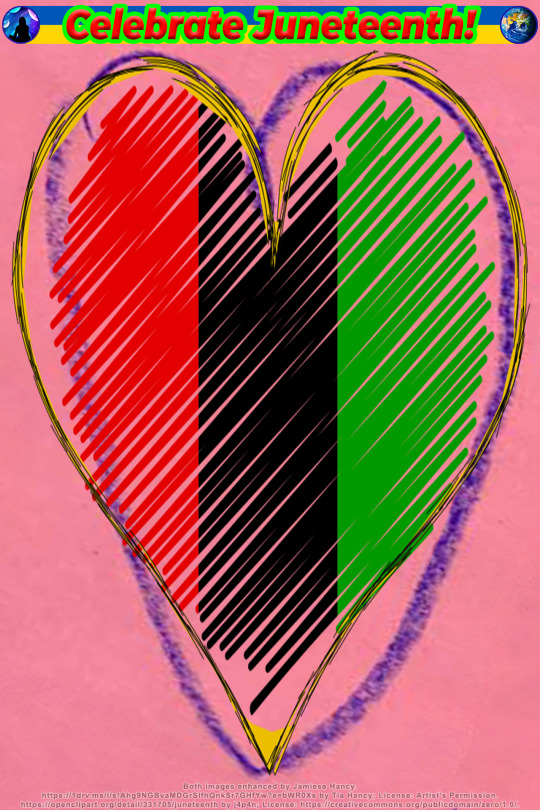
❤️ Juneteenth – Proof That Love Can Conquer All! [11]
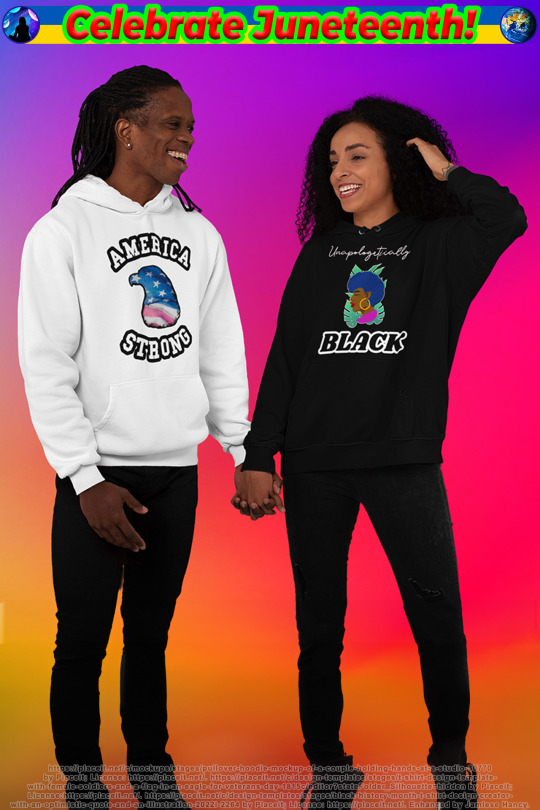
👕 Stylish Apparel for a Juneteenth Celebration [12]
📷 Image Sources:
1. https://commons.wikimedia.org/wiki/File:Slave_Raid,_Africa,_ca.1800-ca.1865_(imp-cswc-GB-237-CSWC47-LS16-029).jpg by Unknown Artist; License: Public Domain per Source Website. Enhanced by Jamiese Hancy.
2. https://digitalcollections.nypl.org/items/510d47dc-4d67-a3d9-e040-e00a18064a99 by Schomburg Center for Research in Black Culture; License: Copyright Status Unknown per Source Website. Enhanced by Jamiese Hancy.
3. https://www.loc.gov/item/97507511/ by Strobridge Lith. Co.; License: No Known Restrictions on Publication per Source Website. Enhanced by Jamiese Hancy.
4. https://commons.wikimedia.org/wiki/File:Juneteenth_Plaque.jpg by William C Teller; License: https://creativecommons.org/licenses/by-sa/4.0/deed.en. Enhanced by Jamiese Hancy.
5. https://stock.adobe.com/images/international-day-for-the-abolition-of-slavery-december-2-hand-with-chain-and-background-template-for-banner-card-poster/472860869 by MURGROUP; License: https://stock.adobe.com/license-terms. Enhanced by Jamiese Hancy.
6. https://stock.adobe.com/images/black-female-afro-american-slave-with-heavy-rusty-chain-around-her-neck/363636884 by PixlMakr; License: https://stock.adobe.com/license-terms. Enhanced by Jamiese Hancy.
7. https://flic.kr/p/cDAz2U by John Brown (1800-1859); License: https://creativecommons.org/licenses/by/2.0/. Enhanced by Jamiese Hancy.
8. https://picryl.com/media/a-picture-of-slavery-for-youth-1 by Jonathan Walker (1799-1878); License: Public Domain per Source Website. Enhanced by Jamiese Hancy.
9. https://www.fanpop.com/clubs/human-rights/images/256995/title/african-children-photo by alyssa-lauren; License: https://www.fanpop.com/terms. Enhanced by Jamiese Hancy.
10. https://freesvg.org/1547847719 by Herman Miller; License: Public Domain per Source Website. Enhanced by Jamiese Hancy. https://stock.adobe.com/images/silhouette-man-and-milky-way/128865050 by 24Novembers; License: https://stock.adobe.com/license-terms. Enhanced by Jamiese Hancy.
11. https://openclipart.org/detail/331705/juneteenth by j4p4n; License: https://creativecommons.org/publicdomain/zero/1.0/. Enhanced by Jamiese Hancy. https://1drv.ms/i/s!Ahg9NGBvaMDGrSIfhQnkSr7GHfYw?e=bWR0Xs by Tia Hancy; License: Artist's Permission. Enhanced by Jamiese Hancy.
12. https://placeit.net/c/mockups/stages/pullover-hoodie-mockup-of-a-couple-holding-hands-at-a-studio-30770 by Placeit; License: https://placeit.net/. Enhanced by Jamiese Hancy. https://placeit.net/c/design-templates/stages/t-shirt-design-template-with-female-soldiers-and-a-flag-in-an-eagle-for-veterans-day-1815c/editor?stateFolder_Silhouette=hidden by Placeit; License: https://placeit.net/. Enhanced by Jamiese Hancy. https://placeit.net/c/design-templates/stages/black-history-month-t-shirt-design-creator-with-an-optimistic-quote-and-an-illustration-2022i-2264 by Placeit; License: https://placeit.net/. Enhanced by Jamiese Hancy.
https://www.bit.ly/history-of-fathers-day
#juneteenth#juneteenth 2025#juneteenth gifts#juneteenth recipes#what day is juneteenth#juneteenth card#when is juneteenth 2025#gift ideas for juneteenth#juneteenth brunch#juneteenth ideas#happy juneteenth#juneteenth gift ideas#gifts for juneteenth#inspiration#knowledge#empower#family#freedom day#emancipation day#emancipation proclamation#june 19#june 19th#june 19th 1865#abraham lincoln#general gordon granger#galveston#pixoplanet#jamiese#teepublic#zazzle
1 note
·
View note
Text
On June 19, 1865
Thanks for having GA on your mind!
Juneteenth celebrates the end of slavery in the United States. It is also known as EmancipationDay, Juneteenth Independence Day, and Black Independence Day. On June 19, 1865, MajorGeneral Gordon Granger arrived in Galveston, TX, and announced the end of the Civil War andthe end of slavery. Although the Emancipation Proclamation came 2½ years earlier on January 1,1863, many slave owners continued…

View On WordPress
#American freedom#black#blogger#captive#coaching calls#counseling#counselor#emancipation#end of civil war#ga#galveston tx#Georgia Landers#georgias edify#georgiasedify#independence day#june 19#june 19 1865#juneteenth#major#major general Gordon granger#slave owners#slavery#teacher#thanksforhavinggaonurmind#united states
0 notes
Text
On June 19, 1865, Union troops arrived in Galveston, Texas, and Major General Gordon Granger announced the end of the Civil War and that the enslaved people in the town were free. This was the last area in the South to receive the orders that slavery was abolished, and this announcement came over 2.5 years after President Abraham Lincoln issued the Emancipation Proclamation. What has become known as Juneteenth is now a federal holiday since 2021 and it is a symbolic date representing the African American struggle for freedom and equality in the United States and is also a celebration of family and community.
You might ask, what is important about Juneteenth to California history? Slavery was a major topic discussed at the California Constitutional Convention in September 1849. While California did enter the Union on September 9, 1850 as a “free state” as part of Congress’ Compromise of 1850, slavery did exist in California and there were certainly protections under the law that were not awarded to all people. Many enslaved people were brought to California during the Gold Rush.
Early Black civil rights leaders in Sacramento in the 1850s, such as Daniel Blue, Jeremiah B. Sanderson, William Yates, Charles Hackett, and Joseph Smallwood confronted political challenges and sought further representation in California in a time when a Person of Color could not testify against a white person in court. Early California newspapers were full of accounts of enslaved people paying for their freedom, testimonies by anti-slavery and civil rights activists, and stories covering plaintiffs suing for freedom. Elements of slavery continued in California through the Civil War.
The Emancipation Proclamation, General Granger’s announcement, and the 13th, 14th, and 15th Amendments to the U.S. Constitution after the Civil War did not solve issues of freedom and equality. The struggle of civil rights continued through the 20th Century and the extension of those rights to all people continues to this day.
For today, Jared letterpress printed “JUNETEENTH” in 30 line pica wood type. The typeface is French Clarendon and the type was made by the Hamilton Wood Type Company in the late 1880s. This was printed with yellow, red, and green ink using our Washington hand press, which was made in 1852.
#juneteenth#museum#sacramento#history#letterpress#printing#art#asmr#printmaking#old sacramento#oddly satisfying
618 notes
·
View notes
Text

Juneteenth (officially Juneteenth National Independence Day) is a federal holiday in the United States commemorating the emancipation of enslaved African Americans. Deriving its name from combining June and nineteenth, it is celebrated on the anniversary of the order by Major General Gordon Granger proclaiming freedom for enslaved people in Texas on June 19, 1865 (two and a half years after the Emancipation Proclamation was issued). Originating in Galveston, Juneteenth has since been observed annually in various parts of the United States, often broadly celebrating African-American culture. The day was first recognized as a federal holiday in 2021, when President Joe Biden signed the Juneteenth National Independence Day Act into law after the efforts of Lula Briggs Galloway, Opal Lee, and others.
#black history#black tumblr#black literature#black excellence#black community#juneteenth#black history is american history#civil rights#equal#equal rights#black lives matter#independence
998 notes
·
View notes
Photo

On this day, 19 June 1865, after the US civil war, Union general Gordon Granger gave a proclamation in Galveston, Texas, stating: "The People of Texas are informed that, in accordance with a proclamation from the Executive of the United States, all slaves are free. This involves an absolute equality of personal rights and property rights between former masters and slaves". It then clarified that the relationship between formerly enslaved people and their enslavers should become "that between employer and hired labor. The freedmen are advised to remain quietly at their present homes and work for wages… they will not be supported in idleness either there or elsewhere." As news of the declaration spread across the state, large numbers of enslaved people began to effectively go on strike and desert their plantations, returning to states they came from or heading for cities containing Union troops. The following year, Black Texans decided to celebrate Juneteenth on June 19, holding festivities and parades. And in subsequent years the celebrations grew, and spread with Black migration to cities like Los Angeles, Oakland and Seattle. Later in the 20th-century the holiday had largely faded from the public mind, but in the 1980s Black activists made a concerted effort to reinvigorate Juneteenth as a public holiday. It was officially recognised in Texas in 1980, and following mass Black-led protests in 2020 was made a federal holiday in 2021, although many employers still do not give paid leave for Juneteenth celebrations. Back in the 1800s, one formerly-enslaved Texan, Felix Haywood, later reflected on his emancipation: "We thought we was going to get rich like the white folks... But it didn’t turn out that way. We soon found out that freedom could make folks proud, but it didn’t make ’em rich.” More: https://stories.workingclasshistory.com/article/9111/Juneteenth Pic: Juneteenth celebration, 1900 https://www.facebook.com/photo.php?fbid=647159507457268&set=a.602588028581083&type=3
481 notes
·
View notes
Text
In this column, Charles Blow provides the historical context for Juneteenth, and the continuously "evolving" struggle for "freedom" for Black people in the U.S. This is a gift🎁link, so anyone can read this entire column even if they don't subscribe to the NY Times. Below are some excerpts:
Last week at a Juneteenth concert on the South Lawn of the White House, Vice President Kamala Harris said that on June 19, 1865, after Union troops arrived in Galveston, Texas, “The enslaved people of Texas learned they were free.” On that day, she said, “they claimed their freedom.” [...] Although it’s a mark of progress to commemorate the end of American slavery, it’s imperative that we continue to underscore the myriad ways in which Black freedom was restricted long after that first Juneteenth. [...] Most Black people couldn’t claim their freedom on June 19, 1865, because their bodies (and their free will) were still being policed to nearly the same degree and with the same inveterate racism that Southern whites had aimed at them during slavery. The laws governing the formerly enslaved “were very restrictive in terms of where they could go, what kind of jobs they could have, where they could live in certain communities,” said Daina Ramey Berry... the author of “The Price for Their Pound of Flesh: The Value of the Enslaved, From Womb to Grave, in the Building of a Nation.” [...] Upon arrival in Galveston, the Union general Gordon Granger delivered General Order No. 3, which said “the connection heretofore existing” between “former masters and slaves” would become “that between employer and hired labor” and that “freedmen are advised to remain quietly at their present homes and work for wages.” The order also had a curious stipulation: that freedmen would “not be supported in idleness.” [...] A notice from Granger published days later in The Galveston Daily News informed the public that “no persons formerly slaves will be permitted to travel on the public thoroughfares without passes or permits from their employers.” In other words, white people would still dictate where Black people could be. In 1866, a Texas state constitutional convention adopted the state’s Black Codes, codifying suffocating limits on Black autonomy. As the Texas State Library and Archives Commission describes these laws:

In this way, the codes “outlined a status for African Americans not too much removed from their earlier condition as slaves.” Beyond this, for Black people in the 1870s, being a convict in Texas essentially meant relegation to enslavement, because that was when the state’s convict leasing program took off. [...] The question of labor is at the core of how we must understand emancipation and Reconstruction because American slavery, an entire capitalist system representing billions of dollars in wealth, was built on free Black labor, was brought to its knees and would have to be propped up; newly freed Black people were fed back to the machine to keep it running. [...] As Corey Walker, the director of the program in African American studies at Wake Forest University, emphasizes, the idea of freedom, particularly for Black people in this country, is continuously being negotiated and contested, so “Juneteenth marks a moment in the ever-evolving and expanding project of American democracy.” “It is,” he said, “a project that is never complete. It is never fulfilled, even at the moment of Juneteenth. And it’s one that is ever evolving to this day.” [emphasis added]
#juneteenth#race in america#freedom came with strings attached#slavery#black americans#black history#charles blow#the new york times#gift link
46 notes
·
View notes
Note
hi! 21f, semi-lit to literate writer looking for someone to write with via discord! i’m looking for mainly canon x canon but im okay with oc x oc. i love found family tropes, romance, angst, and hurt/comfort. no NSFW please! i generally only rp female characters, but im okay with mxf or fxf. these are the universes/characters im looking to write:
Marvel: Gwen Stacy, Yelena Belova, Pepper Potts, OCs
Harry Potter: Hermione Granger, Lily Evans, OCs
DC: Barbara Gordon
Miraculous Ladybug: Marinette (aged up, also willing to do a Maribat AU!), OCs
Percy Jackson: Annabeth Chase, Hazel Levesque, OCs
School Bus Graveyard: Ashlyn
If you have another fandom you like, ask! I’m into a lot of different mediums and shows. React to this post and I’ll shoot you a message!
.
#eighteen and over#marvel#marvel roleplay#marvel rp#harry potter#harry potter roleplay#harry potter rp#dc#dc roleplay#dc rp#miraculous ladybug#pjo#school bus graveyard
24 notes
·
View notes
Text
Anderson Bonner
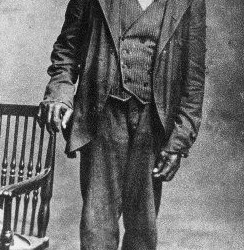
Prominent Texas landowner and businessman Anderson Bonner was born enslaved in Alabama around 1839. Not much is known about his younger years. Family history states that Bonner was given as a wedding present to the daughter of his former master, who moved him from Alabama to Arkansas. Anderson may have been “refugeed” in Texas during the Civil War when nearly 100,000 enslaved people from neighboring states were forcibly brought there by slaveholders to avoid the Union Army freeing them as it gradually occupied more of the Confederacy. If Bonner was in Texas by 1865, he—like other Lone Star state enslaved people—gained his freedom when Union General Gordon Granger and Union Troops under his command arrived in Galveston on June 19, 1865 and pronounced the end of slavery. That announcement became the basis for the Juneteenth holiday.
Sometime in 1865 Bonner married a woman known only as Eliza. Over time the couple had ten children, Anderson Jr, Newton, William, Ed, John, Andy, Mary, Martha, Charlie and Nash. Bonner arrived in Dallas, Texas, around 1870 with his brother Louis, and sister Caroline and they worked on a farm in the White Rock Creek area. Bonner by this time had acquired modest wealth. The 1870 Census lists his financial worth at $275 or approximately $5,456 in 2020 dollars. On August 10, 1874 Bonner purchased sixty acres of land, signing the deed with an “X”, as he never learned to read or write. He soon began leasing his land and the houses on it to cotton growing sharecroppers. With the money he earned, he bought more land. Bonner eventually amassed over two thousand acres of land in what is now North Dallas and the Dallas suburb of Richardson. The Medical City Dallas Hospital now sits on what was once the Bonner farm and the North Central Expressway divides Bonner’s original property.
Census records in 1900 reveal that six of the ten Bonner children still lived on the Bonner farm. Cotton, corn, and fruits were grown on the family farm worked mostly by Bonner, his children, and sharecroppers. Bonner’s sister, Caroline married into the Fields family, and one of her children married into the Giddings family, both prominent African American families of Dallas in the late 19th Century. In 1903, Eliza was killed in a oil lamp explosion in the family home. Sixty-four-year-old Bonner then married a woman named Lucinda, but the couple had no children.
Anderson Bonner passed away at the age of 82 in 1920. He was buried in White Rock Colored Union Cemetery (now White Rock Garden of Memories Cemetery), in Addison county. His descendants established the Anderson Bonner Endowment Scholarship that helps support Richardson Public School students who attend Prairie View A&M University. The first public school for black children in the North Dallas, the Vickery and Hillcrest school was renamed the Anderson Bonner School before its closing in 1955. The city of Dallas officially named the park west of Medical City Hospital, Anderson Bonner Park in 1976. The park consists of 44.1 acres of Bonner’s original land.
58 notes
·
View notes
Text
Today in 1865, Union forces occupying Texas issue General Order No 3, officially informing all slaves in the former Confederate state that they are henceforth free in accordance with the Emancipation Proclamation of 1863. The occasion would later be celebrated as Juneteenth, Freedom Day.
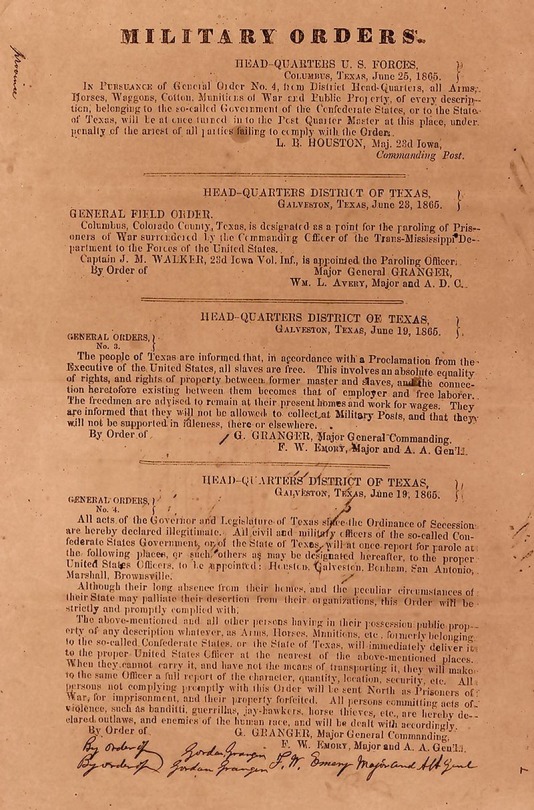
The general order was issued by Union General Gordon Granger on June 19, 1865, upon arriving at Galveston, Texas, at the end of the American Civil War and two and a half years after the original issuance of the Emancipation Proclamation.
A common misconception holds that the Emancipation Proclamation freed all slaves in the United States, or that the General Order No. 3 on June 19, 1865, marked the end of slavery in the United States. In fact, the Thirteenth Amendment, ratified and proclaimed in December 1865, was the article that made slavery illegal in the United States nationwide, not the Emancipation Proclamation.
General Order No. 3 states:
“The people of Texas are informed that, in accordance with a proclamation from the Executive of the United States, all slaves are free. This involves an absolute equality of personal rights and rights of property between former masters and slaves, and the connection heretofore existing between them becomes that between employer and hired labor. The freedmen are advised to remain quietly at their present homes and work for wages. They are informed that they will not be allowed to collect at military posts and that they will not be supported in idleness either there or elsewhere.” (source)
While the order was critical to expanding freedom to enslaved people, the racist language used in the last sentences foreshadowed that the fight for equal rights would continue.
#juneteenth#black history#blacklivesmatter#june 19#general order 3#emancipation day#slavery#emancipation#general order number 3#otd#otdih
211 notes
·
View notes
Text

#Juneteenth is the oldest nationally celebrated commemoration of the ending of slavery in the United States.
Dating back to 1865, it was on June 19th that the Union soldiers, led by Major General Gordon Granger, landed at Galveston, Texas with news that the war had ended and that the enslaved living there were now free. Note that this was two and a half years after President Lincoln’s Emancipation Proclamation - which had become official January 1, 1863. Texas did not act to comply with the Emancipation Proclamation so The Emancipation Proclamation had little impact on the Texans due to the minimal number of Union troops to enforce the new Executive Order. However, with the surrender of General Lee in April of 1865, and the arrival of General Granger’s regiment, the forces were finally strong enough to influence and overcome the resistance.
Later attempts to explain this two and a half year delay in the receipt of this important news have yielded several versions that have been handed down through the years. Often told is the story of a messenger who was murdered on his way to Texas with the news of freedom. Another, is that the news was deliberately withheld by the enslavers to maintain the labor force on the plantations. And still another, is that federal troops actually waited for the slave owners to reap the benefits of one last cotton harvest before going to Texas to enforce the Emancipation Proclamation. All of which, or neither of these version could be true. Certainly, for some, President Lincoln's authority over the rebellious states was in question For whatever the reasons, conditions in Texas remained status quo well beyond what was statutory.
Today Juneteenth commemorates African American freedom and emphasizes education and achievement. It is a day, a week, and in some areas a month marked with celebrations, guest speakers, picnics and family gatherings. It is a time for reflection and rejoicing. It is a time for assessment, self-improvement and for planning the future. Its growing popularity signifies a level of maturity and dignity in America long over due. Sensitized to the conditions and experiences of others, only then can we make significant and lasting improvements in our society.
21 notes
·
View notes
Text
- Atlas Masterlist - [Requests are open]
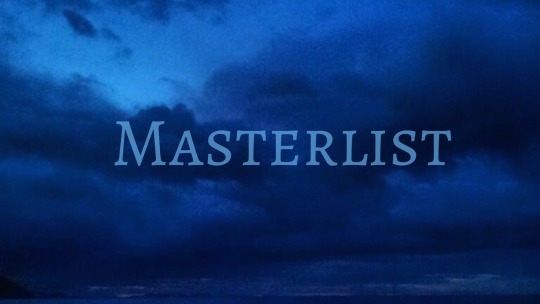
▪️Male reader
▫️Female reader
🔲 Gender neutral
🔳 Male/ Female Oc
Avatar: The Legend Of Korra/ The Last Airbender:
Asami Sato:
🔳 - War of Hearts- I, II, III, IV, V, VI, VII, VIII, XI, X , XI
Avatar Korra:
Butterfly Effect
Lin Beifong
Katara
Suyin Beifong
Mako
Bolin
Azula
Senna
Kya
Kuvira
Percy Jackson:
Annabeth Chase:
🔲- Strategic Minds and Wild Hearts
Percy Jackson
Jason Grace
Thalia Grace
Piper McLean
Hazel Levesque
Nico DiAngelo
Sally Jackson
Silena Beauregard
Drew Tanaka
Harry Potter :
Hermione Granger
Harry Potter
Narcissa Black
Lily Evans
Daphne Greengrass
Narcissa Black
Ginny Weasley
Fleur Delacour
Penny Haywood :
- Baby Problems
Cassandra Vole:
▪️- Unexpected Surprises
▪️- Tme Wrap: Bizarrely Adventures!
Scream:
Sidney Prescott :
- ▪️ Flight or Figth
Tara Carpenter:
▪️ A Nigth Out
Gale Weathers
Sam Carpenter:
▪️A Nigth to Remember
Fairy Tail:
Erza Scarlet:
🔲- A Taste of Love
Natsu Dragneel
Grey Fullbuster
Lucy Heartfilia :
🔲 - Friends…? Friends.
Mirajane Strauss
Juvia Lockser
Irene Belserion
Attack On Titan:
Mikasa Ackerman:
-▫️ Fake It ‘Till You Break It - I
Eren Yeager
Historia Reiss
Annie Leonheart
Pieck Finger
Jean Kriestean
Sasha Braus
Hange Zoe
Marvel Universe:
Natasha Romanoff:
▫️A Hero’s First Flight
▪️Breaking the Chains
Laura Kinney:
▪️Into the Wild
▪️Into the Void
Jean Grey
Emma Frost
Wanda Maximoff
Maria Hill:
▫️A Hero’s First Flight
Cindy Moon:
▪️ The Bat, The Spider, and The Mutant
Gwen Stacy:
▪️ Tangled in the Web
Felicia Hardy
Mary-Jane Watson
Ororo Monroe
DC Universe:
Cassandra Cain:
▪️The Bat, The Spider, and The Mutant
▪️The Super’s Bats
🔲- Silent Glances and Secret Smiles
🔲- Shadows of the Past — Birds of a Feather pt.2 — Weight of Memories pt.3 — Weight of the Past pt.4
▪️Shadows of Grief
🔲- A New Begining
▫️ Quiet Echoes of Love
▫️ Cracks in the Shell
Helena Bertinelli:
▫️Under the Spotlight
Barbara Gordon:
▫️- Cards on the Table
Dick Grayson
Poison Ivy
Kara Zor-El:
▫️The Flight of the Owl
Wonder Woman:
▪️The Wonder and the Guardian of Themyscira
▫️Unseen Bonds
Cassandra Sandsmark
Zatanna Zatara
Talia al Ghul:
▫️Duty and Devotion
▫️ A Not-So-Quiet Visit
Lady Shiva
Starfire
The Vampire Diaries/ The Originals:
Caroline Forbes:
▪️ Late Night Talking
Katherine Pierce:
🔲- Blood Ties
Rebekah Mikaelson
Hayley Marshal
Bonnie Bennett
Hope Mikaelson:
🔲- Bound by Blood
Davina Clare
Freya Mikaelson
The Witcher:
Cirilla of Cintra
Geralt of Rivia
Yennefer of Vengerberg
Acotar:
Feyre Archeron
Nesta Archeron
Morrigan
Elain Archeron
K-pop/K-drama girls (to add more):
Aespa:
Yu Jimin:
▪️ Where it Begins
Red Velvet:
Bae Joohyun:
▫️ Nobody Knows
Park Sooyoung:
🔲- The Way You Make Me Feel
Ive:
Ahn Yujin:
🔲- Bound by The Distance Between Us
Twice:
Sana Minatozaki:
🔲- Operation: Sweet Serenade
Katseye
Le Sserafim
Girls Generation
All of us are dead
Doona
Manhwa/comics ( to add more):
Navier Trovi :
- 🔳 Honor me of this dance
Penelope Eckart
Samantha Wilkins/ Atom Eve
Mark Grayson /Invincible
Video game girls ( to add more):
Laura Croft:
🔲- Between Adventures — Beneath the Surface pt.2
▪️ Treasures of the Heart
▪️ A Game of Hearts and Ruins
Jill Valentine:
▪️Through Fire and Ruin Against the Clock pt.2
Haley Carter (Stadew Valley):
🔲- Daylight
Sadie Adler (Red Dead Redemption)
Sam Giddings (Until Dawn)
Kitanna (Mortal Kombat)
Sonya Blade (Mortal Kombat)
Claire Redfield
Ada Wong
TV Shows/ Series (to add more):
Miraculous Ladybug:
Marinette Dupain- Cheng/ Ladybug
Kagami
Chlöe Bourgeois
Arcane/League of Legends:
Caitlyn Kiramman:
▫️The Edge of Loyalty
Mel Merdada:
▪️ Alchemy of Minds
Luxanna (Lux)
KD/A
Teen Wolf:
Lydia Martin
Kira Yukimura
Allison Argent
Bridgerton:
Daphne Bridgerton
Francesca Bridgerton
Kate Sharma
Fate: The Winx Saga:
Bloom
Stella
Flora
Scooby-Doo: Mysteries S.A:
Daphne Blake
Power Rangers:
Rpm:
▪️Reunion Amid the Chaos
Naruto ( to add more):
Hinata Hyuga
Sakura Haruno:
▫️A New Tide
Tsunade Senju:
▫️Quiet Storm
Kushina Uzumaki
#the legend of korra#harry potter#reader insert#percy jackon and the olympians#acotar#marvel#dc universe#throne of glass#fem reader#male reader#navier ellie trovi#penelope eckhart#fairy tail#attack on titan#invincible#jujutsu kaisen#scooby doo#winx club#all of us are dead#miraculous ladybug#resident evil#tom raider#tvd universe#the originals#stardew valley#the witcher#naruto#kdrama#kpop#katseye
71 notes
·
View notes
Text
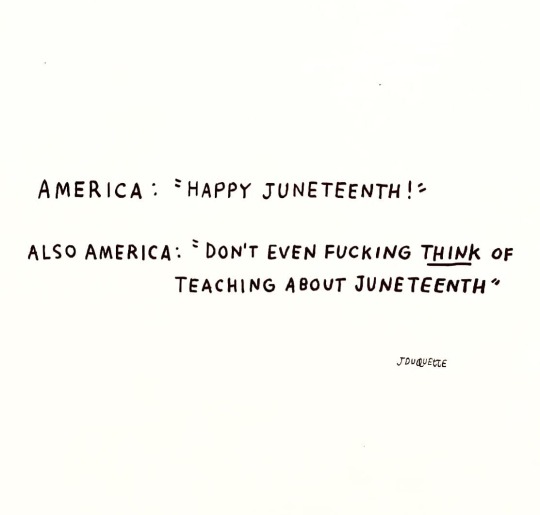
LETTERS FROM AN AMERICAN
June 19, 2024
HEATHER COX RICHARDSON
JUN 20, 2024
Today is the federal holiday honoring Juneteenth, the celebration of the announcement in Texas on June 19th, 1865, that enslaved Americans were free.
That announcement came as late as it did because, while General Robert E. Lee surrendered his Army of Northern Virginia to General Ulysses S. Grant of the U.S. Army on April 9, 1865, it was not until June 2 that General Edmund Kirby Smith surrendered the Trans-Mississippi Department, the last major army of the Confederacy, to the United States, in Galveston, Texas. Smith then fled to Mexico.
Seventeen days later, Major General Gordon Granger of the U.S. Army arrived to take charge of the soldiers stationed in Texas. On that day, June 19, he issued General Order Number 3. It read:
“The people of Texas are informed that, in accordance with a proclamation from the Executive of the United States, all slaves are free. This involves an absolute equality of personal rights and rights of property between former masters and slaves, and the connection heretofore existing between them becomes that between employer and hired labor.”
Granger’s order was not based on the Thirteenth Amendment to the Constitution, which abolished enslavement except as punishment for a crime. Although Congress had passed that amendment on January 31, 1865, and Lincoln had signed it on February 1, the states were still in the process of ratifying it.
Instead, Granger’s order referred to the Emancipation Proclamation of January 1, 1863, which declared that Americans enslaved in states that were in rebellion against the United States “shall be then, thenceforward, and forever free; and the Executive Government of the United States, including the military and naval authority thereof, will recognize and maintain the freedom of such persons.” Granger was informing the people of Galveston that, Texas having been in rebellion on January 1, 1863, their world had changed. The federal government would see to it that, going forward, white people and Black people would be equal.
Black people in Galveston met the news Order No. 3 brought with celebrations in the streets, but emancipation was not a gift from white Americans. Black Americans had fought for the United States and worked in the fields to grow cotton the government could sell. Those unable to leave their homes had hidden U.S. soldiers, while those who could leave indicated their support for the Confederacy and enslavement with their feet. They had demonstrated their equality and their importance to the United States.
The next year, after the Thirteenth Amendment had been added to the Constitution, Texas freedpeople gathered on June 19, 1866, to celebrate the coming of their freedom with prayers, speeches, food, and socializing. By the following year, the federal government encouraged “Juneteenth” celebrations, eager to explain to Black citizens the voting rights that had been put in place by the Military Reconstruction Act in early March 1867, and the tradition of Juneteenth began to spread to Black communities across the nation.
But white former Confederates in Texas were demoralized and angered by the changes in their circumstances. “It looked like everything worth living for was gone,” Texas cattleman Charles Goodnight later recalled.
In summer 1865, as white legislators in the states of the former Confederacy grudgingly ratified the Thirteenth Amendment, they also passed laws to keep freedpeople subservient to their white neighbors. These laws, known as the Black Codes, varied by state, but they generally bound Black Americans to yearlong contracts working in fields owned by white men; prohibited Black people from meeting in groups, owning guns or property, or testifying in court; outlawed interracial marriage; and permitted white men to buy out the jail terms of Black people convicted of a wide swath of petty crimes, and then to force those former prisoners into labor to pay off their debt.
At the same time, those determined to preserve their power began to rewrite the history of the Civil War. The war had irrevocably undermined the institution of enslavement in the American South, moving it far beyond the ability of white southerners to reinstate it (although some historians argue that without the Thirteenth Amendment enslavement might have moved into the western mines). So white supremacists began to claim that secession had never been about slavery, despite the many declarations of secession saying the opposite. With the Freedmen’s Bureau, created by Congress in March 1865, defending the rights of Black Americans, certain white southerners began to claim that their “cause” had been to protect the rights of the states against a powerful federal government that was forcing on them a way of life they opposed.
In the 1820s, before he became president, Andrew Jackson argued that true democracy meant honoring the votes of those in the states rather than laws made by Congress. This idea justified minority rule. Under this argument, a state’s voters could choose to take the land of their Indigenous neighbors or enslave their Black neighbors even if the majority of Americans, speaking through Congress, opposed those policies, because what mattered was the local vote. Crucially, states also decided who could participate in voting, and before the Civil War, the body politic was almost exclusively white men.
The Black Codes were a clear illustration of what that system meant. Congress refused to readmit the southern states with the codes, and in 1866, congressmen wrote and passed the Fourteenth Amendment to the Constitution. Its first section established that “All persons born or naturalized in the United States, and subject to the jurisdiction thereof, are citizens of the United States and of the State wherein they reside.” It went on: “No State shall make or enforce any law which shall abridge the privileges or immunities of citizens of the United States; nor shall any State deprive any person of life, liberty, or property, without due process of law; nor deny to any person within its jurisdiction the equal protection of the laws.”
That was the whole ball game. The federal government had declared that a state legislature—no matter who elected it or what voters called for—could not discriminate against any of its citizens or arbitrarily take away any of a citizen’s rights. Then, like the Thirteenth Amendment before it, the Fourteenth declared that “Congress shall have the power to enforce, by appropriate legislation, the provisions of this article,” strengthening the federal government.
The addition of the Fourteenth Amendment to the Constitution in 1868 remade the United States of America.
But those determined to preserve a world that discriminated between Americans according to race, gender, ability, and so on, continued to find workarounds. Key to those workarounds has always been resurrecting the idea that true democracy means reducing the power of the federal government and centering the power of the state governments, where voters—registered according to state laws—can choose the policies they prefer…even if they are discriminatory.
In our era, those discriminatory policies are not just racial. They often center religion and include attacks on women’s healthcare and right to abortion, LGBTQ+ Americans, immigrants, and non-Christians. Just today, Louisiana governor Jeff Landry signed into law a measure requiring that every classroom in Louisiana public schools display the Ten Commandments. Those embracing the law hope to push the question of public displays of their faith to the Supreme Court, where they expect a warmer reception from this court than such discriminatory positions have gotten since the 1950s.
If states get to determine who votes and can pass discriminatory legislation without interference by the federal government, they can construct the kind of world Americans lived in before the Fourteenth Amendment. As several Republican-dominated states have already demonstrated, they can also rewrite history.
In 1865, Juneteenth was a celebration of freedom and the war’s end. In 1866 it was a celebration of the enshrinement of freedom in the U.S. Constitution after the Thirteenth Amendment had been ratified. In 1867, Juneteenth was a celebration of the freedom of Black men to vote, the very real power of having a say in the government under which they lived.
In a celebration of Juneteenth on June 10, 2024, Vice President Kamala Harris noted: “Across our nation, we witness a full-on attack on hard-fought, hard-won freedoms and rights, including the freedom of a woman to make decisions about her own body; the freedom to be who you are and love who you love openly and with pride; the freedom from fear of bigotry and hate; the freedom to learn and acknowledge our nation’s true and full history; and the freedom that unlocks all others: the freedom to vote.”
LETTERS FROM AN AMERICAN
HEATHER COX RICHARDSON
#Heather Cox Richardson#Juneteenth#history#freedom#the Thirteenth Amendment#racism#Black people#American Civil war
12 notes
·
View notes
Text

This Day in History: Juneteenth
On this day in 1865, slaves in Galveston, Texas, learn that they are free. The anniversary of today’s events has come to be known as Juneteenth.
But why did it take Galveston so long to receive the news? The Civil War had been over for more than two months.
Okay, so the war was officially over, but pockets of fighting continued to erupt, even after Robert E. Lee’s surrender at Appomattox. Moreover, Texas was at the remote ends of the then-existing country. It took time for news to travel.
Union soldiers didn’t reach Galveston until the middle of June. On June 19, Union Army General Gordon Granger finally stood on a Galveston balcony and read aloud an order emancipating slaves.
The story continues here: https://www.taraross.com/post/tdih-juneteenth
#tdih#otd#this day in history#history#history blog#America#American history#juneteenth#sharethehistory
9 notes
·
View notes
Text
Pride Collection CC Kit by make_it_sizzle
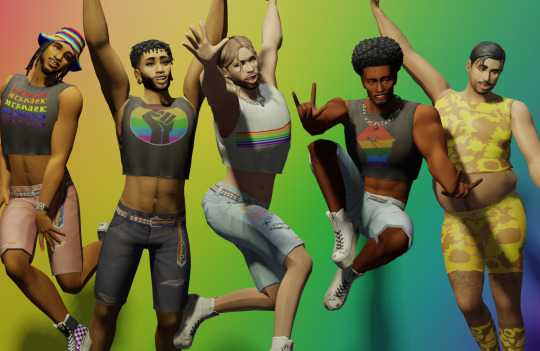
I’m excited to announce the release of my Pride Collection CC Kit. On this special month of June, we celebrate Juneteenth and Pride month. As an African American man who also happens to be gay and play The Sims, creating this CC kit was so important for me. I truly feel as though the spirit of Storme DeLarverie should be in each and every one of us, which is why I named one of my CC items after them.
Below is a brief history of the two holidays.
If you do not already know, Juneteenth commemorates the end of slavery in the United States. Celebrated annually on June 19th, its origins date back to 1865. On June 19, 1965, General Gordon Granger rode into Galveston, Texas, and announced that enslaved people were now free. However, the enslaved people had no idea they had already been emancipated. That June 19th announcement arrived 2 and a half years after President Lincoln issued the Emancipation Proclamation on January 1st, 1863.
The first Pride was a riot. Pride Month is an annual celebration of many of the contributions made by the LGBTQ+ community to cultures, society, and history worldwide. Pride commemorates its roots in the Stonewall Riots that occurred on June 28th, 1969. As was a common practice in many cities, the New York Police Department (NYPD) would occasionally raid bars where gays and lesbians were known to gather. On June 28, police dragged patrons and employees out of Stonewall In, a popular gay bar in Manhattan, New York, and several people fought back against the NYPD. It was said that Storme DeLarverie, a gay rights activist, threw the first punch at the riot. A crowd of people slowly but surely grew which turned into a 6 day protest which was led largely by Black LGBTQ+ women that marched the streets of Manhattan.
Patreon: Download (Free)
Included with this CC kit:
Pride Hat:
Gender inclusive
9 swatches
Teen-Elder
BGC
High-top Converse shoes
Gender inclusive
4 swatches
Teen-Elder
BGC
Pride jean shorts
10 swatches
Teen-Elder
BGC
Pride tank top
Gender inclusive
4 swatches
Teen-Elder
BGC
Necklace (2 lengths)
5 swatches
Teen-Elder
BGC
Leggings
3 swatches
Teen-Elder
BGC
Socks
3 swatches
Teen-Elder
BGC
BONUS CONTENT:

DeLarverie Hair
Hat Compatible
Maxis 24 swatches
Teen – Elder
BGC
Vertices: 11195 Polygons: 18604
#sims 4#ts4#s4mm#ts4mm#maxis match#black simblr#black simmer#juneteenth#pride#happy pride 🌈#happy juneteenth#pride 2023#ts4 male cc#ts4 male lookbook#make it sizzle cc finds#t-sizzler#makeitsizzle#tsizzler#gay#lgbt pride#queer
62 notes
·
View notes
Text
Okay, general roundup of New 52 titles I have read so far, now I am well into 2013 in my read through:-
Batwoman, J.H. Williams run – genuinely great. This is a highlight of the New 52, honestly. If DC had stopped occasionally remembering that Kate Kane is now Bruce’s cousin and had let Kate and Maggie get married, it would be perfect.
Blue Beetle – it’s not the best Jaime run I’ve ever read, but in terms of restructuring Jaime’s origin to simplify it and remove the heavy connection with Infinite Crisis shenanigans, it worked far better than the Rebirth reboot. Let down by getting cancelled just as it started becoming more interesting (aka had finally finished the retread of Jaime’s origin story and started him having new adventures).
Threshold – this was certainly a comic I read entirely to see Jaime in it. If you are lucky enough to know nothing about it, it’s basically a planet of foxhunting tagged ‘criminals’, where Jaime ends up one of the tagged. It’s meandering, pointless and bad. I think if you’re a Lantern fan you’d also think it was bad. Deservedly knocked off after 8 issues.
Justice League Dark – I made it through 6 issues. My biggest takeaways were that everyone here was just so miserable and Boston Brand was dating Dawn Granger for reasons that surpassed understanding. I want to like it more than I do, for the cast it has.
Batgirl, Gail Simone run – appealing and infuriating in turn. There’s some genuinely beautiful writing here (the WWII paper balloons!) and Babs is recognisable as Babs, but it’s horribly let down by the fact that ‘healing’ Barbara means that she’s now both not allowed to operate as Oracle (by editorial dictat) AND she’s having trouble as a street vigilante as she’s still recovering from her injuries. It makes sense but it also makes Barbara doubly incompetent which is maddening as they’ve taken away everything that was hers specifically. Also James Gordon Jnr is always intensely irritating to have around and I am never going to get over giving Babs a villain called ‘Knightfall’ in the run immediately after healing her back. Yes. I got the reference. It’s not that funny.
Birds of Prey – it’s hmmm still finding its feet. Lacks the soul of the original run, but there are flashes of the old magic occasionally. It is hilarious to me that they decided to merge Dinah Drake and Dinah Lance back into a single character for this run, creating a bizarre new ex-husband for Dinah in Kurt Lance (seriously, Kurt Lance, why do you exist you’re so weird) and then within 6 issues or so abruptly realised WHY Dinah Drake and Dinah Lance have been separate characters since 1983 and reinvented a new Dinah Drake mother for the character. Spectacular. Sheer evidence that nobody involved in new 52 was actually spending much time thinking about how an all new origin reboot would affect characterisation.
Batman – I have my differences with Scott Snyder over his run, but he at least manages to make things interesting and spend time interrogating Bruce’s identity. It feels in conversation with the Loeb and Dini storylines around Thomas Elliot and that whole crowd of elite Gothamites. Lots of interesting set ups let down by execution or obsession with conspiracy theories. Love his work with Harper Row as a character.
Batman & Robin – okay folk, I do agree, this is a far far better Batman & Robin run than 2009. I feel like I’ve spent more time with Damian showing me his character rather than being informed by Morrison via Alfred mouthpiece about Damian’s character. There’s some lovely character work in here. It’s still suffering from getting New 52ed but it’s honestly the first run anywhere that’s actually really good for Damian characterisation (plus or minus the Damian and Colin Wilkes fight Zsasz plot in Streets of Gotham or Gates of Gotham).
Batman Incorporated – fuck you Grant Morrison. Nobody reading this title is having a good time. If you’re here for actual Batman Inc characters well I’m sorry, they’re mostly standing around the sidelines of a plot about Bruce, Talia and Damian. If you’re here for Talia I’m so sorry for you. If you’re here to read Bruce and/or Damian you get like 3-4 sweet scenes that I am sure you have already seen in screencapped panels floating around with no context. DC would be a better place if this book hadn’t been approved (also Cyril might still be alive)
Nightwing – this comic so far is obsessed with Haly’s Circus. Now I don’t like the whole Talon retcon (I think it cheapens a lot of things about Dick’s backstory as a character) but I will admit it’s nice to see Dick spending time with his Haly’s Circus friends and Dick’s optimistic side coming out in the ‘let’s just rebuild Amusement Mile as a place that isn’t Joker-haunted!’ Tragically of course because we’re never allowed to have nice plotlines involving Haly’s Circus it gets blown up again and lots of people die. But at least Dick’s back to owning the circus, amirite? (For bizarre ‘Pop Haly left it to him in his will’ reasons rather than Dick buying it out with his inheritance money that is totally not one of the many occasions Bruce has lied to Dick and told him that this trust fund is 100% based on investments of his parents assets, rather than Bruce attempting to give Dick Wayne money again so he stops living out of cardboard boxes in a tiny apartment)
Red Hood and the Outlaws – I have now suffered through three whole issues of this comic (actually 4 but I paged through that one to read like one scene at the end) and it is determined to make me hate everyone involved with it in terms of its disrespect for Roy and Kory. Also all the issues kept trying to convince me that Jason and Tim have always been each others’ favourite brothers, which lol. (If that’s actually ever true for Jason it’s the most hilarisad thing ever).
Teen Titans – I made it through two issues for crossover purposes. I am tempted to come back as I think I will get some stuff out of it once I’ve finished my Teen Titans 2003 read (and look there does actually appear to be some things in here I may enjoy). Can’t believe Kurt Lance shows up in this comic. I swear he’s my new nemesis.
Suicide Squad – I am 100% not reading this comic, I only opened it for crossover issues. What have they done to Amanda Waller. (Also why is Harley Quinn trying to date Floyd Lawton, did editorial suddenly realise how many people are into his deep uh comradery with Thomas Blake and overreact trying to remove the gay cooties or something?)
Catwoman and Detective Comics – honestly I haven’t got a good enough read on either yet from the few issues I’ve read, but ‘Tec is running a Penguin plot and I’m not in the mood for a Penguin plot at the moment.
So far, my recommendations: Batwoman I recommend without hesitation. Batman & Robin has been embroidered in fans’ memories but is worthwhile in any case. Batman is interesting stories sometimes let down in execution and may actually read better if you avoid touching any tie-in issues for a readthrough.
Nightwing, Batgirl, Birds of Prey and Blue Beetle are “these are some of my favourite characters, I want to know even if I don’t always like it” reads. They’re still the same characters, just trapped in a maddening world.
26 notes
·
View notes